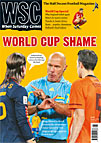 Central Berlin seemed an excellent place to take in a successful World Cup for Germany. Not so simple, as Karsten Blaas explains
Central Berlin seemed an excellent place to take in a successful World Cup for Germany. Not so simple, as Karsten Blaas explains
German Team Let Their Fans Down read a headline two days after the semi-final against Spain. It wasn’t the 1-0 defeat by the future world champions that had caused outrage but the news that the players had gone on holiday after returning home rather than showing up on the so-called Fan Mile in Berlin to celebrate their successful campaign.
Of course, the squad would have deserved a hero’s welcome. They played perhaps the most spectacular football ever seen from a German team, qualifying yet again for the semi-finals. They also acted as “ambassadors in shorts”, as legendary team coach Sepp Herberger used to put it, in presenting a positive image of a New Germany. This was a football team that didn’t need fluke goals, penalties or madmen in goal to win matches, representing a multicultural nation where people from different ethnic backgrounds get along. Of course, integrating migrants in a football team is far easier than in a society. (According to a recent survey, one third of teenagers from German families take the A-level equivalent, compared to ten per cent of those with foreign backgrounds.) And despite all their skill, Germany had their share of old-time good luck, too (such as the performance of a Uruguayan linesman).
The nation, however, was enthusiastic. TV audiences reached an all-time high of over 31 million, tripling the number that follow club football. Streets and houses were redecorated in black, red and gold flags for four weeks. The newly elected president, Christian Wulff, jumped on the bandwagon after only a couple of days in office and announced that the coach and players will be awarded a medal of honour.
So why did the players duck the jubilation in Berlin? The official reason was that they needed some rest after six weeks in the South African winter where half of them had caught flu. Also, they allegedly didn’t feel much like partying after yet another near miss, coming home empty handed just like in 2006 and in 2008. But the real reason is probably that Fan Miles suck.
During the home World Cup four years ago, it became popular to watch football in city centres crammed in front of giant TV screens. Initially, I quite enjoyed this “public viewing”, as these events are referred to in anglicised German. After all, this was the first peaceful national hysteria this country has ever seen. But I changed my mind 15 minutes before the semi-final. As part of their pre-match coverage, ARD reported live from the Brandenburg Gate, where half a million people had gathered to watch the game. When they saw themselves on the screen, they started chanting “This is what winners look like” and jumped about. Spurred on by a DJ, they cheered like Germany had just won the cup. Two hours and a Carles Puyol goal later, the mob was devastated – girls cried and young men fought among themselves and with the police.
A football crowd in a stadium has a number of ways of coping with defeat. They can shout louder in an attempt to change the course of the game, express annoyance about the team’s performance or pride in previous achievements, or revert to black humour. On the Fan Mile, however, there is no room for subtleties. Ecstasy is the only possible state of mind, and there is no Plan B if things should start to go wrong.
It’s easy to imagine what the team’s reception would have looked like: an endless row of Mexican waves, “Deutschland” chants and terrible techno music, occasionally interrupted by Seven Nation Army. This may have met many people’s idea of a good time, but it would have been inappropriate for a team who played marvellous football but nevertheless saw their hopes of winning the World Cup shattered. Germany’s performances had their moments of elation, of course, but there was also fear, hope, relief, disappointment and, finally, contentment about the bronze medal. The same edition of the paper that complained about the team not turning up in Berlin contained the new fixture list for the fourth division where my local team play. No matter what their season is like, I’m sure that my predominant feeling for most of the year will not be ecstasy but boredom and cold feet. It will be a welcome change, though.
From WSC 282 August 2010